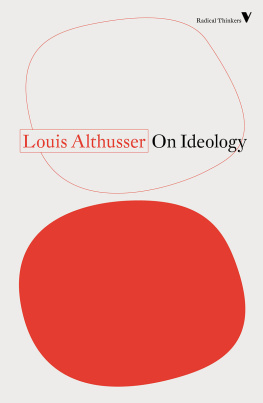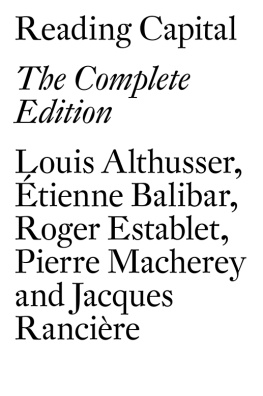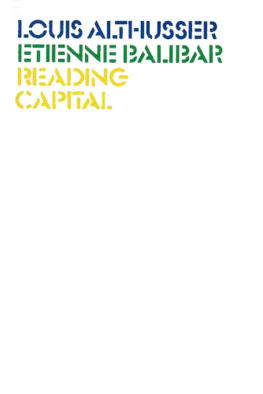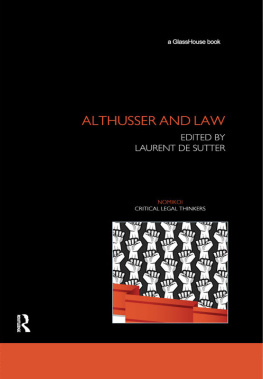Contents

ON IDEOLOGY
ON IDEOLOGY
Louis Althusser

First published by New Left Books 1971
Copyright New Left Books 1971, 1976
This edition published by Verso 2008
Copyright Verso 2008
Ideology and Ideological State Apparatuses first published in La Pense
1970 (copyright La Pense 1970); Reply to John Lewis first published in
Marxism Today, OctoberNovember 1972, rewritten, expanded and republished
as Rponse a John Lewis by Franois Maspero 1973 (copyright
Louis Althusser 1973); Freud and Lacan first published in La Nouvelle
Critique 1964 (copyright La Nouvelle Critique 1964), translation
copyright New Left Review 1969; A Letter on Art in Reply to Andr
Daspre first published in La Nouvelle Critique 1966
(copyright La Nouvelle Critique 1966).
All rights reserved
The moral rights of the author and translators have been asserted
1 3 5 7 9 10 8 6 4 2
Verso
UK: 6 Meard Street, London W1F 0EG
USA: 180 Varick Street, New York, NY 10014-4606
www.versobooks.com
Verso is the imprint of New Left Books
ISBN-13: 978-1-84467-202-8
British Library Cataloguing in Publication Data
A catalogue record for this book is available from the British Library
Library of Congress Cataloging-in-Publication Data
A catalog record for this book is available from the Library of Congress
Printed and bound by ScandBook AB, Sweden
Contents
Ideology and
Ideological State Apparatuses
(Notes towards
an Investigation)
ON THE REPRODUCTION OF THE CONDITIONS OF PRODUCTION
I must now expose more fully something which was briefly glimpsed in my analysis when I spoke of the necessity to renew the means of production if production is to be possible. That was a passing hint. Now I shall consider it for itself.
As Marx said, every child knows that a social formation which did not reproduce the conditions of production at the same time as it produced would not last a year. The ultimate condition of production is therefore the reproduction of the conditions of production. This may be simple (reproducing exactly the previous conditions of production) or on an extended scale (expanding them). Let us ignore this last distinction for the moment.
What, then, is the reproduction of the conditions of production?
Here we are entering a domain which is both very familiar (since Capital Volume Two) and uniquely ignored. The tenacious obviousnesses (ideological obviousnesses of an empiricist type) of the point of view of production alone, or even of that of mere productive practice (itself abstract in relation to the process of production) are so integrated into our everyday consciousness that it is extremely hard, not to say almost impossible, to raise oneself to the point of view of reproduction. Nevertheless, everything outside this point of view remains abstract (worse than one-sided: distorted) even at the level of production, and, a fortiori, at that of mere practice.
Let us try and examine the matter methodically.
To simplify my exposition, and assuming that every social formation arises from a dominant mode of production, I can say that the process of production sets to work the existing productive forces in and under definite relations of production.
It follows that, in order to exist, every social formation must reproduce the conditions of its production at the same time as it produces, and in order to be able to produce. It must therefore reproduce:
1. the productive forces,
2. the existing relations of production.
Reproduction of the Means of Production
Everyone (including the bourgeois economists whose work is national accounting, or the modern macro-economic theoreticians) now recognizes, because Marx compellingly proved it in Capital Volume Two, that no production is possible which does not allow for the reproduction of the material conditions of production: the reproduction of the means of production.
The average economist, who is no different in this than the average capitalist, knows that each year it is essential to foresee what is needed to replace what has been used up or worn out in production: raw material, fixed installations (buildings), instruments of production (machines), etc. I say the average economist = the average capitalist, for they both express the point of view of the firm, regarding it as sufficient simply to give a commentary on the terms of the firms financial accounting practice.
But thanks to the genius of Quesnay who first posed this glaring problem, and to the genius of Marx who resolved it, we know that the reproduction of the material conditions of production cannot be thought at the level of the firm, because it does not exist at that level in its real conditions. What happens at the level of the firm is an effect, which only gives an idea of the necessity of reproduction, but absolutely fails to allow its conditions and mechanisms to be thought.
A moments reflection is enough to be convinced of this: Mr X, a capitalist who produces woollen yarn in his spinning-mill, has to reproduce his raw material, his machines, etc. But he does not produce them for his own production other capitalists do: an Australian sheep-farmer, Mr Y, a heavy engineer producing machine-tools, Mr Z, etc., etc. And Mr Y and Mr Z, in order to produce those products which are the condition of the reproduction of Mr Xs conditions of production, also have to reproduce the conditions of their own production, and so on to infinity the whole in proportions such that, on the national and even the world market, the demand for means of production (for reproduction) can be satisfied by the supply.
In order to think this mechanism, which leads to a kind of endless chain, it is necessary to follow Marxs global procedure, and to study in particular the relations of the circulation of capital between Department I (production of means of production) and Department II (production of means of consumption), and the realization of surplus-value, in Capital, Volumes Two and Three.
We shall not go into the analysis of this question. It is enough to have mentioned the existence of the necessity of the reproduction of the material conditions of production.
Reproduction of Labour-Power
However, the reader will not have failed to note one thing. We have discussed the reproduction of the means of production but not the reproduction of the productive forces. We have therefore ignored the reproduction of what distinguishes the productive forces from the means of production, i.e. the reproduction of labour power.
From the observation of what takes place in the firm, in particular from the examination of the financial accounting practice which predicts amortization and investment, we have been able to obtain an approximate idea of the existence of the material process of reproduction, but we are now entering a domain in which the observation of what happens in the firm is, if not totally blind, at least almost entirely so, and for good reason: the reproduction of labour power takes place essentially outside the firm.
How is the reproduction of labour power ensured?
It is ensured by giving labour power the material means with which to reproduce itself: by wages. Wages feature in the accounting of each enterprise, but as wage capital, not at all as a condition of the material reproduction of labour power.











